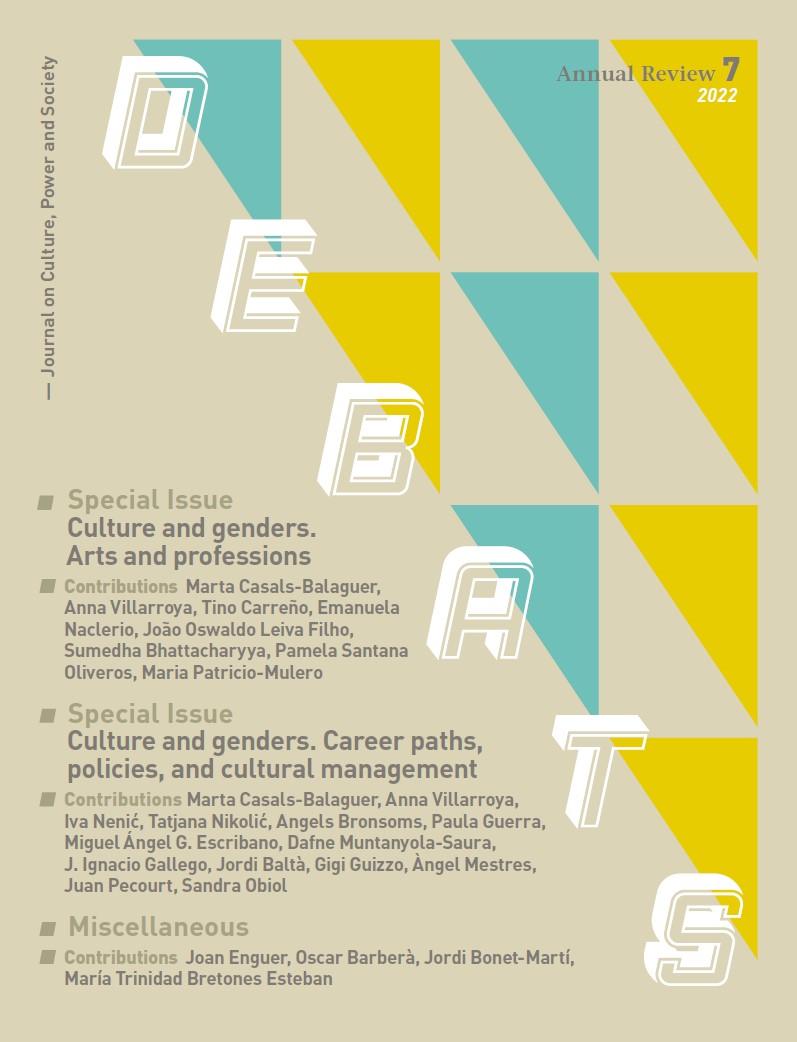Macha Caporal: bridging gaps, embodying resistance
Resumen
The following article explores the practice and performance of a group (or ‘block’) of Macha Caporal dancers. These women appropriate the costumes, movements, and name of the male character (Macho Caporal) in the Bolivian Caporales dance. Given the demarcated gender structure established in Caporales—represented by the Macho Caporal and Cholita (female character) couple—the appearance of the new role of the Macha Caporal in the dance has led to social questioning about the performances and identities of women who dance as Machas Caporales. Based on ethnographic research undertaken from a gender perspective in 2018 in the city of La Paz (Bolivia), this current article analyses how the performance of Macha Caporal dancers reveals these women’s non-conformity with the discriminatory gender norms present in their wider social contexts. Through the accounts
of these women and their descriptions of the circumstances in which they practice and perform the Caporales, we revealed the conditions in which they dance. This made visible the dynamics of inequality and violence present in the environment of the folkloric entradas (dance parades) in the city of La Paz. Finally, this study examined how the organisation of women into independent blocks and their style of movement could be understood as acts of resistance and political action in a setting characterised by chauvinism and inequality.
Descargas
Citas
Ahmed, S. (2017). Living a Feminist Life. Durham: Duke University Press.
Benavente, J. (2017). De los Andes al margen: disidencia y transgresión en manifestaciones andinas en Santiago de Chile
(Tesis de maestría, Pontificia Universidad Católica de Chile, Chile). https://repositorio.uc.cl/handle/11534/21338
Butler, J. (1988). Performative acts and gender constitution: An essay in phenomenology and feminist theory.
Theather Journal, 40(4), 519-531. http://www.jstor.org/stable/3207893
Butler, J. (2006). Deshacer el género. Barcelona: Ediciones Paidós Ibérica.
Butler, J. (2015). Notes towards a Performative Theory of Assembly. Massachusetts: Harvard University Press.
Conquergood, D. (2002). Performance Studies: Interventions and Radical Research. TDR (1988-), 46(2), 145–156.
http://www.jstor.org/stable/1146965
Cooper Albright, A. (2013). Engaging bodies: The Politics and Poetics of Corporeality. Middletown: Wesleyan University
Press.
Dolan, J. (1985). Gender impersonation onstage: Destroying or maintaining the mirror of gender roles?. Women
& Performance: A Journal of Feminist Theory, 2(2), 5-11.
Fisher, J. (1993). Out of the Shadows: Women, Resistance and Politics in South America. Londres: Latin America Bureau.
Fléty, L. (2015). Les cortèges de la fortune: Dynamiques sociales et corporelles chez les danseurs de morenada (La Paz,
Bolivie) (Tesis doctoral no publicada). Université Paris Ouest, Francia.
Foster, S. L. (1998). Choreographies of Gender. Signs, 24(1), 1-33. http://www.jstor.org/stable/3175670
Godinez, J. A. (2014). Oruro: Catedral del folklore de Bolivia (2ª ed.). Bolivia.
Gómez, N., Mendiola, W., y Pinto, R. (2010). Caporales 100% boliviano: La historia del evento mundial de Caporales.
La Paz: Editorial Campo Iris.
Guaygua, G. (2003). La Fiesta del Gran Poder: el escenario de construcción de identidades urbanas en la ciudad
de La Paz, Bolivia. Temas Sociales, 24, 171-184. http://www.scielo.org.bo/pdf/rts/n24/n24a12.pdf
Gutiérrez, A. (2005). Las Prácticas Sociales: Una Introducción a Pierre Bourdieu. Córdoba: Ferreyra Editor.
Hanna, J. L. (1987). To dance is human: a theory of nonverbal communication. Londres: The University of Chicago Press.
Kowal, R., Siegmund, G., y Martin, R. (eds.). (2017). The Oxford Handbook of Dance and Politics. Nueva York: Oxford
University Press.
Lazar, S. (2008). El Alto, Rebel City: Self and Citizenship in Andean Bolivia. Durham y Londres: Duke University Press.
Meftahi, I. (2016). Gender and Dance in Modern Iran: Biopolitics on stage. Londres y Nueva York: Routledge.
Programa de las Naciones Unidas para el desarrollo. (2002). Informe de desarrollo humano de género en Bolivia: 2003.
La Paz: Plural Editores.
Polhemus, T. (1993). Dance, gender and culture. En H. Thomas (ed.), Dance, gender and culture (p. 3-15). Basingstoke:
Palgrave Macmillan.
Reed, S. (2012). La política y poética de la danza. En S. Citro, y P. Aschieri (eds.), Cuerpos en movimiento: Antropología
de y desde las danzas (p. 75-100). Buenos Aires: Editorial Biblos.
Sánchez, M. (2006). País de Caporales: Los Imaginarios del Poder y la Danza de los Caporales en Bolivia (Tesis de
maestría no publicada). Universidad Nacional de Cuyo, Argentina.
Schechner, R., y Brady, S. (2013). Performance Studies: An Introduction (3ª ed.). Nueva York: Routledge.
https://doi.org/10.4324/9780203125168
Singh, A. (2021). Staging Feminisms: Gender, Violence and Performance in Contemporary India. Nueva York y Londres:
Routledge.
Sliwinska, B. (ed.) (2021). Feminist Visual Activism and the Body. Londres y Nueva York: Routledge.
Taylor, D. (2016). Performance. Durham y Londres: Duke University Press.
Whitney Templeman, R. (2001). Women in the world of music: Latin America, Native america, and the African
diaspora. En K. Pendle (ed.), Women and Music: A History (p. 438-459). Bloomington: Indiana University Press.
Young, I. M. (1980). Throwing like a girl: A phenomenology of feminine body comportment, motility and spatiality.
Human Studies, 3(2), 137-156. http://www.jstor.org/stable/20008753
Descargas
Publicado
Cómo citar
Número
Sección
Licencia
Sin perjuicio de lo dispuesto en el artículo 52 de la Ley 22/1987 de 11 de noviembre de Propiedad Intelectual, BOE del 17 de noviembre de 1987, y conforme al mismo, los autores o autoras ceden a título gratuito sus derechos de edición, publicación, distribución y venta sobre el artículo, para que sea publicado en Debats. Revista de cultura, poder y sociedad.
Debats. Revista de cultura, poder y sociedad se publica bajo el sistema de licencias Creative Commons según la modalidad «Reconocimiento - NoComercial (by-nc): Se permite la generación de obras derivadas siempre que no se haga un uso comercial. Tampoco se puede utilizar la obra original con finalidades comerciales».
Así, cuando el autor o autora envía su colaboración, acepta explícitamente esta cesión de derechos de edición y de publicación. Igualmente autoriza a Debats. Revista de cultura, poder y sociedad, la inclusión de su trabajo en un fascículo de la revista para que se pueda distribuir y vender.











